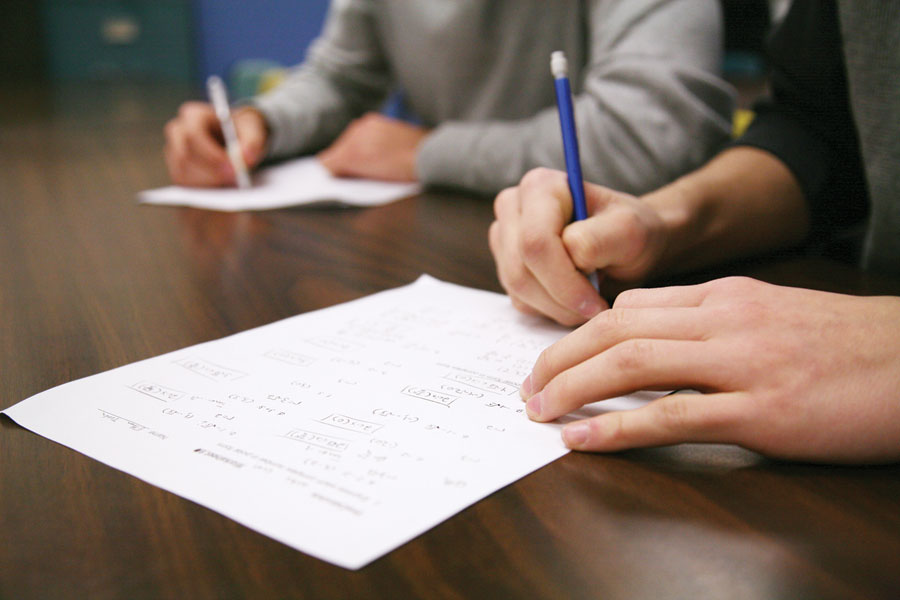Anything for the grade
Photo Illustration by Storrie Skalisky
Students at Wenatchee High School often turn to cheating their way through tests and homework. WHS faculty weighs in on the growing trend.
In the eyes of those administering the tests
A few years ago, Brent Grothe, a longtime faculty member at Wenatchee High School, was handing out a final to his students when he noticed one of his kids looked as though he was copying off his neighbor’s paper. Later, while Grothe corrected that student’s exam, he compared the two students’ papers and soon realized that the answers were very much alike but he was unable to fully prove that cheating had taken place.
Grothe waited all summer and on the first day of school that fall, he confronted that student. “I told him, ‘You cheated on my final and I know it,’” said Grothe. “Then I turned around and walked off.”
Everyone is aware that cheating occurs. Students, administrators and most of all teachers, have noticed cheating both in and out of the classroom.
Whether answers are exchanged on a homework assignment or copying off a quiz, it is a serious problem, according to Grothe. Students are not helping their preparation for the real world by taking someone else’s work or ideas and calling it their own, said Grothe. “Besides, you don’t feel good about who you are when you cheat.”
Some teachers enforce the no cheating rule more than others. For example, it’s known to have desks spread apart during test time or occasionally the teacher will patrol the classroom, alert for any wandering eyes or whispering voices. If caught looking at another student’s papers, many teachers will take the test away and award zero points to the cheater.
Wenatchee High School social studies teacher, Brian Lee, uses other methods as well. Lee gives his tests in the form of essays and long answer questions, that way a quick glance at another paper becomes ineffective. “I tend to avoid multiple choice questions as much as I can,” Lee said.
Tom Baumeister, a math teacher at WHS, has taken some of his classes to alternate testing sites such as the LGI, when the cheating got out of hand. That way, it’s easier to spread out the class and monitor the test takers. Baumeister said that his students openly admitted to cheating but it still doesn’t solve the problem of not being able to accurately measure student progress.
Cheating also reflects your character, Grothe said. The snowball effect starts to take place, and eventually it becomes a habit. “Once that habit develops and becomes apart of something students do on a regular basis, they become unprepared for when they are forced to do tough things on their own.”
Students have also started cheating due to the pressure of getting good grades and passing their classes instead of really taking the time and putting in the effort of learning and understanding the material, according to the American Psychological Association. “The increasing amount of pressure on students to succeed academically tends to be one of the biggest drivers of cheating’s proliferation.”
Another dilemma that comes from cheating is that it does not prepare students for what is ahead of them, said Lee. “Kids end up leaving Wenatchee High School thinking that they’re prepared for life and college.”
Other struggles that come from cheating are for teachers trying to decide whether or not students are being honest in what they really know. When a student’s work appears to be someone else’s, trying to determine how knowledgeable a student is can be very difficult. “[Cheating] sometimes results in lack of discipline; they haven’t prepared or they haven’t put the time or effort into getting ready,” Grothe said.
The most cheating or copying occurs in busywork because students don’t see it as very meaningful so therefore they choose to take the easy way out, Grothe said. “So to them, taking answers from somebody else seems justified.”
Also, it’s a lot more difficult to cheat on tests while a teacher is monitoring the classroom, however homework is done without supervision and it is simple to take the answers from someone else.
“If you look in the mirror in the morning and think, ‘I cheated,’ how do you feel good about yourself?” Grothe said. “You can’t.”
The cheating pandemic
For some it is a bad habit that they can no longer break, but others argue that cheating is a necessity. While some see cheating as an unfair way for other classmates to get an easy grade that they believe has not been earned. One thing is certain, those who choose to partake in this practice have their motives and tricks to work their way around the education system.
“It is annoying to think that my homework doesn’t matter if other people are copying to get theirs done,” freshman Lizbeth Valencia said. “It makes me mad. They aren’t getting anything from it.”
Like many other students, cheating on tests is a habit built from the pressure of getting the best grades possible for anonymous source who we will call Senior Girl.
“A little bit of it is pressure to get a good grade on a test, but it’s just the easier way out if you don’t study the night before,” Senior Girl said. “Even if you know the material, it’s just kind of a habit at this point. Kind of a backup plan.”
Senior Girl agrees that some students simply don’t care about studying and take cheating as their first option.
“I think a lot of them just don’t want to take the time to study the night before or week before. So they just rely on somebody else who does study, take their answers, and get credit,” Senior Girl said. “You just improvise where the teacher is in the room, then by looking around you find which person is the best person to cheat off. Then you sit next to the closest person.”
Some students, like sophomore Ivan Lopez, choose to opt out of cheating and see it as an unfair technique without strict regulation to prevent it.
“I feel like it’s not right when there are people who take the time to study and others just get the right answers by cheating and get the same score,” Lopez said. “Plus, it shouldn’t be that way since we get a warning when tests are so you have to take advantage of your time. Most teachers don’t even watch for cheating; I have only heard of one person getting caught this year.”
The education system has also put students under the pressure that they must get the best grades regardless of the methods, according to the source who will be referred to as Junior Boy. So that leaves the question, what is more important: grades or learning?
“That is a great question. Yeah I will take the time to study, but it’s a lot about the grades; especially if you are trying to get into college,” Junior Boy said. “School isn’t so much about learning. It is about getting the best grades. There are several intelligent people without good grades.”
Learning sneaky tricks from the veterans is one way that students who do cheat get around the grading system. This is how the anonymous source who will be called Senior Boy started.
“I learned from an upperclassman. It was like two years ago,” Senior Boy said. “I’d get inside of a pen, a flair pen, with a ballpoint pen to change answers on my test. The upperclassman was selling them, and then I bought one. I started making my own and handed them out to people. I never made any money off of them.” The inside of a flair pen would be altered to allow the students to make changes to their answers on tests instead of taking points off for any missed questions.
Another method for cheating comes from copying prepared classmates, suggests Senior Girl.
“It really does depend on the teacher and how strict they are. If they walk around the classroom the whole time or if they’re in the back at their desk,” Senior Girl said. “Then it’s really easy to look at the two people diagonal in front of you and get a good view of their tests.”
Others explain cheating with being overwhelmed with school work, sports, clubs, work or all of the previous. Different students manage this type of situation a variety of ways, but Sophomore Boy, an anonymous source, admits cheating is an easy outlet that helps him manage his workload.
“Usually cheating happens because there is other work or activities. I don’t have the time to do the work sometimes so it’s faster to copy or get a picture,” Sophomore Boy said. “It doesn’t help you learn, but it helps your grade and that is what matters now.”
Junior Christa Dietrich tries to understand why someone would cheat on their test or homework. Cheating, necessary or not, is left to the judgment of the student’s morals.
“Yes, at times it can get frustrating that they do no work and get the same grade, but then again you have to know what is going on in their life — clubs, sports, plays, or work. It’s hard to get homework done when you work,” Dietrich said. “I know I feel proud of a good and well earned score. I am not the teacher to call them out though.”





